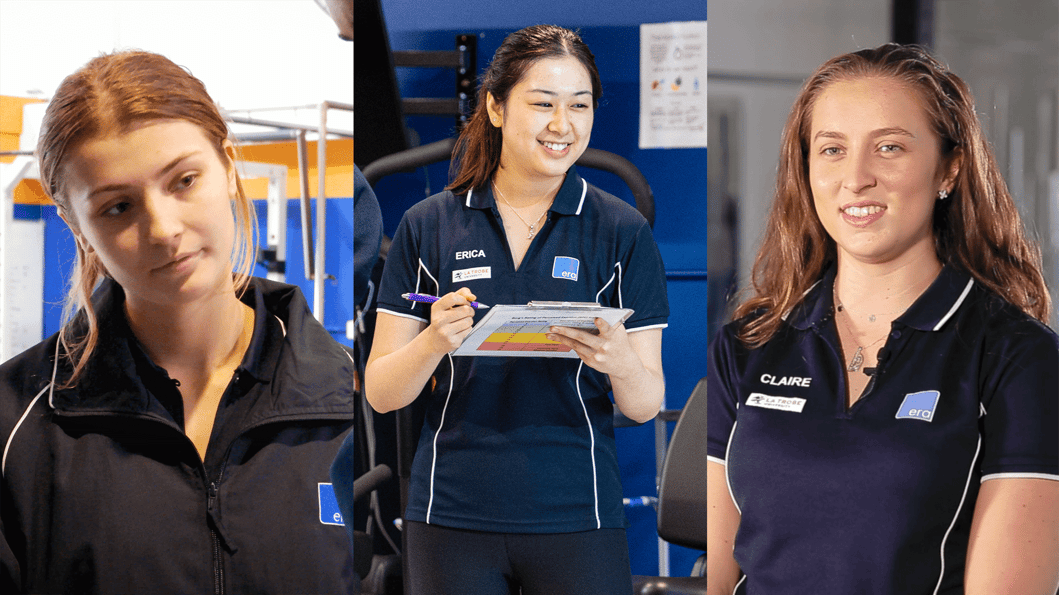Placement Experience with ERA - The Next Step
by James Whaler, on 17/05/2021 11:33:26 AM
"Because ERA understood our University qualification and requirements, they were able to connect us to placements that were relevant to our subject such as The Next Step, which focused on neurological conditions, including spinal injuries and strokes that we work on in the future."
We sat down with Claire, Erica, and Mia to talk about their ERA placement experience at The Next Step Spinal Cord Injury Recovery Centre. The students are all enrolled in the HLT43021 Certificate IV in Allied Health Assistance Program, and currently studying in their second year at University.
Read what each student has to say about their experiences, and check out each of the full interview videos throughout this post, to see what placement at The Next Step is really like!

Claire's Experience
How has the ERA’s Allied Health Assistant (AHA) Program helped to connect you with your placement?
Claire: Because ERA understood that we were physiotherapists, they were able to connect us to placements that were relevant to physiotherapy such as The Next Step, which focused on neurological conditions, including spinal injuries and strokes that we work on as physiotherapists in the future.
The process was very easy. ERA sorted out the placements for us, we just had to put in when we were available around our Uni schedule.
Could you walk us through a typical shift on placement at the Next Step (TNS)?
Claire: The clients at TNS vary a lot. They like to cycle us through all of them during our placement. So, depending on the severity of their condition, they'll have a two-hour or a one-hour session. The spinal injury clients usually have two hours and that starts with them completing grounding exercises, which is run by the EP.
We help organize the equipment needed for the rest of the session, which might include weights. We provide support at their hips to keep them upright.
I've had to learn where I need to hold my hands to best assist them when they're standing, especially at their hips, because I have to be able to keep their hips level and keep their hips forward, but also not do too much that they're still getting the benefit of doing the exercise.
Erica's Experience
How have your mentors at TNS helped develop your skills as an Allied Health Assistant?
Erica: The EP’s at The Next Step have been really helpful throughout my placement. They've taught me a lot of new things, and whenever I have questions, like for example, if they're doing a new exercise with clients or doing some testing with the clients, and I'm not sure why they're doing it, they'll happily explain it.
They'll also give me just tips and tricks here and there on how to more effectively work with clients, which is all really helpful.
Is there a skill you have learned in a class at ERA, that you have been able to put into practice while on placement at TNS?
Erica: I remember in one of my pre-placement modules at ERA, we learned about the six-minute walk tests, which was really helpful because with one of my client clients at the next step clinic they actually needed to do the six-minute walk test for their outcome measure.
My supervisor, Jake, didn't actually have to go through how to do the test with me because I had already been taught how to do the protocol and how to perform the test at ERA, which was really helpful.
Mia's Experience
How has your experience at TNS contributed to shaping the career path you would like to go down?
Mia: I've been able to work with a lot of clients with really complicated and high-risk conditions and it's something I haven't seen and it's really taught me the importance of what a physiotherapist can do.
I have found it so interesting to see that instead of working with high-end elite-level athletes, who are already very mobile, there's another whole side of the spectrum.
That's so interesting. And you can have such an impact on people's lives through that aspect of physiotherapy.
How has the hands-on experience at TNS helped to consolidate what you have been learning at University?
Mia: At the moment at University, we've been learning a lot about the exercise precautions and contra-indications. This is really being consolidated at The Next Step, as we've seen a lot of high-risk individuals who have a lot of precautions to exercise.
When we're learning and at Uni, we're just reading information off a book, and you can't really see the advantages or disadvantages of knowing this content and implementing that into exercise programs.
Whereas at placement, we actually get to see the importance of it and see how to do it and how to make a judgment of what's best for your client for that day. And that's something you can't quite experience at Uni, 'cause you're just learning off a book.
There are plenty more placement opportunities to be accessed through ERA’s AHA Program. Give yourself the head-start you need and work to gain experience in your chosen industry early on in your university degree.
Program Information
The HLT43021 Certificate IV in Allied Health Assistance program is a Nationally recognised qualification that provides the necessary skills and knowledge to work as an Allied Health Assistant (AHA) in hospital, clinic and community work settings. For further information on this qualification, view our Program Overview. Any reference to ‘ERA’s Cert. IV in Allied Health Assistance’, 'ERA's Allied Health Assistance Program', or 'ERA's AHA Program', is to mean HLT43021 Certificate IV in Allied Health Assistance. This training is delivered with Victorian and Commonwealth Government funding. Eligibility criteria apply. This qualification is delivered by Exercise Research Australia Pty Ltd. RTOID: 22490

